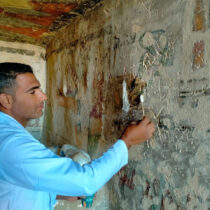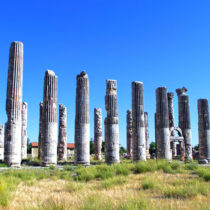For a few months now, the issue of the return of the Parthenon Sculptures has acquired a special momentum. In recent months, the number of reports in the British media is perhaps the greatest ever. UNESCO’s proposal for direct bilateral talks between the British and Greek Ministries of Culture was accepted by the British government for the first time in the history of the Sculptures claim.
“After the global campaign by Melina Mercouri in the 1980s for the return of the Parthenon Sculptures to Greece, the campaign is being continued today by the Greek Prime Minister.” This is pointed out, among other things, in an extensive report by the ITV television network, which highlights the efforts made by the Greek government for the reunification of the Sculptures. “Kyriakos Mitsotakis has raised the issue not only in his recent visit to London, but also in his speech to Congress, thus increasing the pressure on Britain”, ITV reports. At the same time, this report notes the growing support of both the British public and prominent figures in the art world.
Following the Greek Prime Minister’s visit to London in November, where he raised the issue with his British counterpart, Boris Johnson, the Greek position seems to be constantly gaining new important supporters. Most characteristic of all is perhaps the change of “tune” by the London Times, which now is in favour of the return of the Sculptures to Greece. The British newspaper changed its approach “after 50 years” as it pointed out in the leading article of January 11. “Artists and politicians have been arguing for many years that these works of art should be returned to Greece. The museum and the British government, with the support of the Times, resisted the pressure. But times and circumstances change. The sculptures belong in Athens. They should now return”, stressed the British newspaper.
The strong momentum that has built up in favour of the Greek position is also reflected in the polls. In the last one conducted by the YouGov company, 59% of the British public answered that they believe that the Sculptures “belong to Greece”. Only 18% were opposed, while 22% of those asked said they had no opinion.
But also leading figures in the United Kingdom are now publicly, much more often, in favour of the reunification of the Sculptures. Among them is one of the most prominent British directors, Ken Loach, who recently made it clear, once again, that in his view the sculptures were stolen and must be returned immediately to Greece. “One detail that shows the thief’s arrogance is that in Britain they call them the Elgin Marbles. And this is the name of the thief. The idea that we, not us, those in power, are so unconscious of their crime that they name their loot after the man who stole them, says it all about the arrogance of the imperialists. The Parthenon Sculptures should of course be returned immediately. Everyone in a sane mind understands this,” said the award-winning director.
Steven Fry, the distinguished British actor and writer who for many years has been in favour of the return of the Sculptures to Greece, a few days ago repeated in an interview that the British no longer have any substantial argument. “Imagine the Americans’ ‘buying’ the Eiffel Tower from the Germans in 1941 and after the liberation of France in 1945 claiming that because we bought it from the Nazis, it is now ours. It’s outrageous,” Fry told ITV clarifying, at the same time, that “the Parthenon is far more important for Athens than the Eiffel Tower is for the Parisians”.
Edith Hall, professor of classical studies and ancient history at Durham University,is of the same opinion and said: “Most people around the world simply do not understand the British Museum’s arguments. They sound outdated, as if they belong to the 19th and not to the 21st century “.
Lastly, as a British journalist who has been dealing with the issue for years pointed out to the Athens and Macedonia News Agency, “if the pressure exerted by each Greek government continues methodically and persistently, then it is certain that at some point the Sculptures will return to Greece”.





